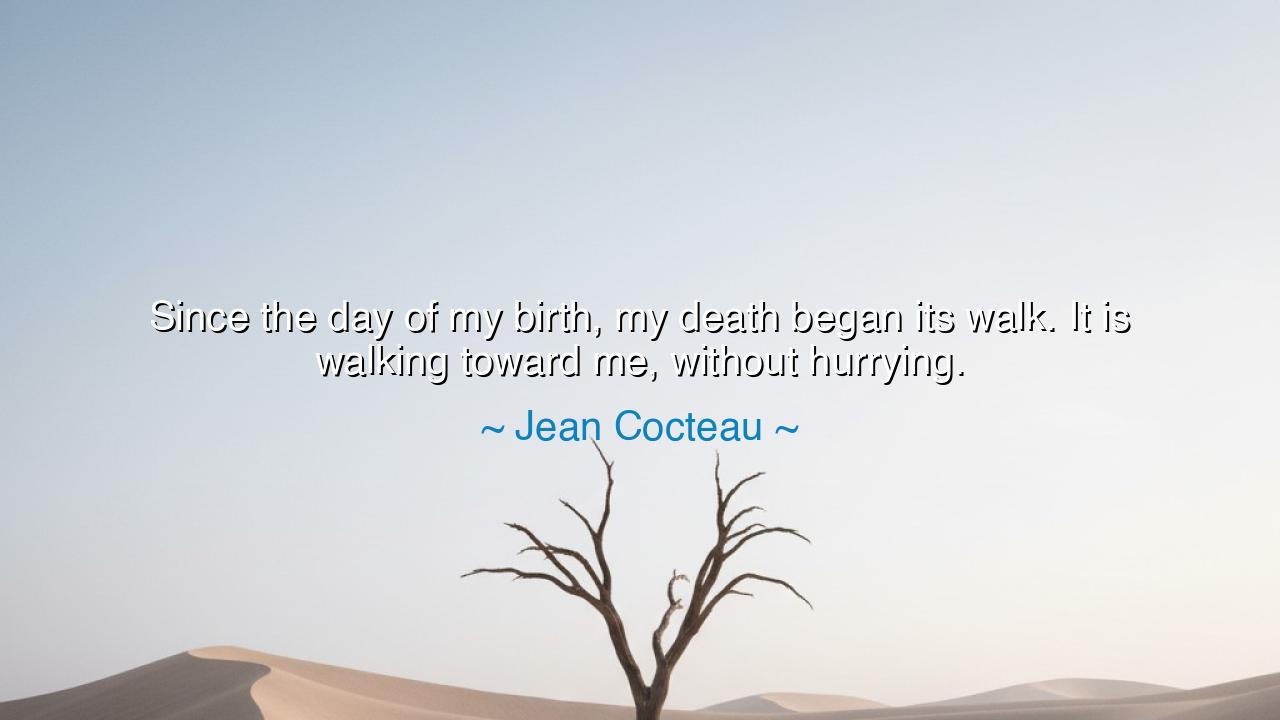
Since the day of my birth, my death began its walk. It is walking
Since the day of my birth, my death began its walk. It is walking toward me, without hurrying.






“Since the day of my birth, my death began its walk. It is walking toward me, without hurrying.” Thus spoke Jean Cocteau, the poet, artist, and dreamer of France—a man who lived as though reality itself were a canvas to be rewritten. In these words, he gives voice to one of life’s oldest and most haunting truths: that death is not an intruder but a companion, one who begins its quiet journey toward us the very moment we take our first breath. Yet Cocteau’s tone is not fearful. There is no panic in his words, no bitterness, no rush. His death “walks without hurrying,” steady and certain, as if to remind us that the end is not a tragedy, but the natural fulfillment of a promise written into the rhythm of existence itself.
Cocteau was not a man of mere morbidity—he was a lover of beauty, a maker of art, a seeker of the divine through the strange and the surreal. To him, life and death were not opposites but partners in a dance, each giving meaning to the other. In this quote, he invites us to see death not as a sudden, violent arrival, but as a gentle procession, moving slowly across the landscape of our years. It neither pursues nor flees; it merely walks. And as it walks, it reminds us that life is finite, that time is sacred, and that every heartbeat is borrowed breath. To live with this awareness is not to despair, but to awaken—to cherish each day as though it were both the first and the last.
The ancients understood this well. The Stoic philosophers taught the practice of memento mori—“remember that you will die.” To them, death was not a curse but a teacher. By keeping death in mind, one learns how to live without waste or regret. The Egyptians built their tombs not from fear of death, but from reverence for continuity—the belief that life and death are two chambers of the same vast house. And the Buddhists, in their wisdom, spoke of impermanence as the key to freedom. To cling is to suffer; to accept the slow walk of death is to find peace. Cocteau’s words are a modern echo of these ancient voices.
Consider the life of Marcus Aurelius, emperor of Rome and philosopher-king. Surrounded by power, glory, and temptation, he wrote daily in his journal to remind himself that every triumph, every pain, every breath, was fleeting. He would look upon the stars and whisper to himself that death walks beside him as calmly as his own shadow. Yet in that awareness, he found strength, not despair. “Do not act as if you were going to live ten thousand years,” he said. “Death hangs over you. While you live, while it is in your power, be good.” Like Cocteau, he saw that the slow, steady approach of death should not frighten us—it should purify our living.
There is a kind of dignity in Cocteau’s imagery—a quiet acceptance, a noble calm. He does not imagine death as a hunter, but as a friend approaching on a distant road. It is “without hurrying” because it does not need to rush; it knows that its meeting is certain. The poet seems to say: why should we fear what has always been with us? The knowledge of mortality is not a shadow over life—it is the light that makes its colors shine. Without death’s steady walk, there would be no urgency to love, no reason to create, no sweetness in the passing of seasons. The brevity of life is the mother of beauty.
The meaning of Cocteau’s quote, then, is both philosophical and spiritual. He reminds us that death is not the enemy of life, but its mirror. To live well is not to flee from death’s approach, but to walk beside it without dread. Each day we live, we move one step closer to the inevitable—but we also have one more chance to make that movement meaningful. Life, he teaches, is not a race against death; it is a conversation with it—a dialogue written in the choices we make, the kindness we give, the courage we show.
And so, my listener, the lesson is clear: do not fear death’s walk; fear only the unlived life. Let every sunrise remind you that death walks toward you gently, and let that awareness awaken you to your purpose. Love deeply, for love outlasts the body. Create boldly, for creation defies time. Forgive freely, for resentment wastes the precious breath that remains. When death at last reaches you, let it find you standing tall, your hands still warm from giving, your heart still alight with wonder.
For in the end, when we meet the quiet traveler who has walked beside us since birth, we will see that he was never a stranger at all—but a faithful guide, leading us home. “Since the day of my birth, my death began its walk,” Cocteau wrote. Let us, then, walk beside our own mortality not in fear, but in gratitude—for it is death’s slow, patient stride that teaches us how to live with grace, with passion, and with the eternal courage to be fully alive.






AAdministratorAdministrator
Welcome, honored guests. Please leave a comment, we will respond soon